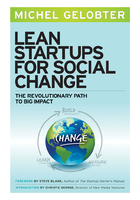
My Journey to Where Lean Meets Social Change
When I started my first company (a social venture called Cooler), I knew I wanted to make consumers a force for progress on global warming. I had already worked for almost twenty years as an environmental justice advocate, as a researcher, and as a government official, and with the passage of a number of groundbreaking laws on climate pollution, I thought I’d pushed the envelope on policy change as far as it could go in the mid 2000s. I wanted to keep moving people in the right direction, and I figured that I’d try to learn to go after them through their pocketbooks rather than the voting booth.
Cooler did OK as far as startups go. We were fast out of the blocks with terrific early customers, but slowed way down with the financial crisis of 2008. I realized that I had to start asking deeper questions about how to be effective in tough times.
My life changed the day I met Steve Blank. He’d been recommended to me as a “startup guru” and, luckily, we had a shared background as environmentalists. He met me at Kepler’s, the famous Menlo Park café/bookstore of startup lore. Steve and I spent a few minutes looking at the impressive platform Cooler had built to tell consumers everything they wanted to know about how their personal spending was impacting climate change. We had a gorgeous interface that magically sucked data from people’s bank accounts and calculated their global warming impact. Even better, we offered a menu of actions they could take to make the world a better place.
Steve cooed at all the appropriate places and I was feeling pretty good. Then he asked me to close my computer. He said that otherwise he’d be distracted by all the fun features. Then he turned to me and asked: “What’s the one thing you most want people to do?”
We chatted and came up with a few good candidates for that one, top-priority, thing. After a bit of this discussion, Steve leaned in to me and, it felt, almost whispered: “You want to build something that barely works, but, if you took it away from people, they’d beg to pay you for it.” I was in business then, and remained so for another eight years, but I knew I’d heard an insight for the ages.
I picked up Steve’s book, Four Steps to the Epiphany, which, along with Geoffrey Moore’s Crossing the Chasm, had already quietly become the bible for startups in Silicon Valley. I applied pieces of it to the clean-tech software companies I was starting or that I worked for. But I still spent a lot of my life on social change, advising friends in government and nonprofits about how technology could accelerate their impact, working at the board of directors level on strategy for the sustainability movement.
Thanks to Eric Ries’s book The Lean Startup, the concept was growing in popularity as a transformative methodology for making new things in the business sector. And the social sector had a lot less money to deal with all the problems that were, by definition, too thorny for the private sector to take on. Surely these techniques were sorely needed to drive social as much as business change.
I started to see how the revolution that Steve’s work was driving in business had equally powerful implications for those of us trying to drive social and policy change. Even more than in business, innovation in social change could be accelerated by the rapid feedback and rapid prototyping that was changing the for-profit landscape. The social sector’s need for efficient ways to test and deploy new ideas was pressing.
Lean techniques also held the promise of dealing with some of the biggest frustrations of social sector innovation. So many social sector innovations are measured by how well they stick to “the plan” rather than by the impacts they have. In climate activism, for example, the real world news was always so hard to take: CO2 emissions were steadily increasing, no matter what policies or campaigns we ran. So we measure our progress by membership or polling data or, even more remotely, by how many high-level elected officials and corporate leaders say that they believe in global warming. Because lean practice is based on new ways of measuring impact, it holds the promise of shifting the social sector to more useful, more immediate real-world measures as well.
At the end of the day, social change is about impact, and I started seeing advice, articles, and tools from the budding lean startup movement materially improve the work of my colleagues in the social sector and grow their impact. Startup nonprofits like Color of Change and the Citizens’ Engagement Laboratory were expanding in scale and impact at unheard-of speeds.
Beyond impact, there are some critical additional reasons for the social sector to understand and to adopt lean practices. So many of the issues addressed by government and nonprofits are a result of business activities, and, thanks to lean startup processes, a whole bunch of new businesses are booming. From Facebook to Tesla to a host of “enterprise” software companies changing the basic infrastructure of government itself, the speedy transformation of our information and technology infrastructure has critical implications for justice and well-being across the board. The social sector needs to raise its game to keep up so that we can be sure that our values still guide the change rather than the other way around.